- Home
- Glynn Stewart
Drifter's Folly (Peacekeepers of Sol Book 4) Page 12
Drifter's Folly (Peacekeepers of Sol Book 4) Read online
Page 12
“Will do, ser,” Chan confirmed. “And the other?”
“Get the same receiver modifications and software running on the other two ships,” Henry said calmly. “See if you can rig up a triangulation program as well. We definitely can’t locate a source with one data point, but with three… With three, I hope we can.
“And if you can give me a definite source for a subspace transmission, I will risk a fight to go say hello.”
Chapter Twenty
“You look like the proverbial cat that ate the canary…except I think your canary was poisonous,” Sylvia observed to Henry at dinner. The counter was ticking down to the Ra-166 skip, but no one in the squadron was expecting trouble until they made the skip after that.
Ra-197 was the first system they’d enter that was claimed by the E-Two, and even that was an uninhabited star they’d claimed for security purposes.
She still figured that Henry was looking particularly pleased with himself, though there was an edge of tension to it all. It might just, she reflected, be that he was probably getting laid tonight—but that hadn’t been unusual on this trip.
Both of them had been single for a while before finding each other, after all.
“I probably do,” he conceded, his grin settling a bit as he took a sip of water. “We’ve found some…interesting things in Avas. I don’t think they’re relevant for our mission to Eerdish, except potentially as negotiating points with the E-Two.”
“All right, you’ve piqued my curiosity,” Sylvia noted. “Talk, Commodore.”
“And if it’s classified and I can’t?” he teased.
“If it was classified and you couldn’t talk, you wouldn’t have mentioned it,” she told him. “So talk.”
Henry grinned wider, and then his face settled back into his usual professional mask as he considered work.
“Avas is being used as a central base for somebody,” he told her. “We don’t know who, because their tech is notably ahead of ours in several concerning ways. That’s the poisonous part of this canary, love.”
“There aren’t many people out there with tech ahead of ours,” Sylvia noted. That was concerning.
“I know,” he allowed. “So, the fact that they’re here is concerning…but we now know they’re here and know we can, at least to some extent, detect them. Which is definitely worth something.”
“That’s fair. Do we try to talk to them?” she asked. Powerful neighbors felt like someone they should try to talk to.
“Right now, I’m betting that they think we didn’t see them,” Henry said. “They carried on with their activities, assuming their stealth tech covered them.” He shook his head, a thoughtful look on his face.
“If they think we missed them, I want them to keep thinking that for now,” he continued. “We’ll arrange a meeting at a better time for us, I think. You’ll get to talk to them sooner or later, my love. Powerful neighbors who hide are scary.”
“Yes,” Sylvia said drily. “That doesn’t seem quite worth the canary expression, Henry.”
“They have a working subspace com and we’ve learned how to detect it,” Henry told her. “Which means we are now going to know if these people are around and calling home. They aren’t going to be sneaking around our space or La-Tar space anymore, and I have to suspect that they were.
“And because we know we can hear them and they don’t know we can, we may have a few surprises in store for them.”
“Now, that explains the canary-eating,” Sylvia said. “Do we even know who they are?”
“No,” he admitted. “I’m guessing Drifters right now. Or potentially somebody we don’t even know—neither the stealth nor subspace com tech lines up with anyone we’ve met.”
“So, trouble,” Sylvia murmured.
“Or potential allies,” he said. “I mean, I’m expecting trouble, but I plan on unleashing you on them.” He raised his water glass. “I have faith in your ability to make friends with people I haven’t shot.”
Sylvia had spent enough nights with Henry by now to know about his nightmares. Internal network control and therapy were holding him together, but her lover was an injured man. Like an amputee with an artificial leg, he could still function and lead, but the injury persisted.
“Don’t joke about things like that,” she said gently. “We’re out here to minimize the shooting.”
“That’s why we’re walking right up to the Eerdish and knocking on the front door,” he agreed. “No, I have faith in our mission, Sylvia. These strangers are a concern, but I have faith in our ability to deal with them—one way or another.”
“And the Avas System is far enough from everyone not to be a threat,” Sylvia observed.
“Exactly. If they were in La-Tar space or Eerdish space, I’d be considering different options,” he admitted. “But out here? Out here, I’m going to record everything I can and let them think they fooled us.”
Chapter Twenty-One
The Eerdish had made certain anyone entering the Ra-197 System knew they claimed it.
“The beacons are positioned at six cardinal points around the star,” Chan reported five minutes after they’d skipped into the system. “The message is pretty simple: the Moti System is property of the Eerdish. Settlement, exploitation or violence is forbidden.
“Then, basically, ‘If you are friends, proceed to Seppen and speak with us,’” Chan concluded. “From the directions included, Seppen is Ra-92.”
“So, the instructions are to do what we planned on,” Henry replied. That was always helpful. It hopefully meant that the E-Two forces in Ra-92—Seppen—would be willing to talk before they opened fire.
“Is there anything else here?” he asked, glancing over at Eowyn.
“Red dwarf system. M-one-type star, point-five solar masses,” she reeled off. “Four small planets, none habitable or even of much interest to anyone. One gas giant, a potential target for refueling infrastructure but currently unexploited.
“There’s an asteroid belt between the planets and the gas giant which, combined with the gas giant rings and Trojans, makes for a decent target for resource extraction.” She shrugged. “There are better systems for just about any purpose out there, but this one is only a nine-hour skip from Seppen.”
“So, less than three days’ travel from Eerdish itself,” Henry said. “Not convenient, not inconvenient. Worth claiming…like they did.”
Any star system contained a near-infinite quantity of resources. Eventually, the easily extractable ones were used up, though—at which point it might become economical to extract readily available resources from another star system for shipment.
“Really, the only value of this system is that it’s only a nine-hour skip from Ra-Ninety—Seppen,” Eowyn told him.
UPSF doctrine was to use local names for stars once they were known. Henry and his people were already attempting to make the change for Moti and Seppen, but it would be imperfect for a while yet.
“I’m surprised there isn’t a picket or something here,” Ihejirika said from the bridge, Paladin’s Captain looking at something on his own screens. “Other than the beacons, the system is dead.”
“If the Eerdish were at peace, they might keep a ship here,” Henry suggested. “But they’re not. We don’t know what their ship strength is, but they’ve been fighting the Kozun for over a year, and this system isn’t on any likely approach vector from the Hierarchy.
“So, they concentrate their forces in Seppen and count on that to stop any approach through Moti,” he concluded. “We’ll likely see a significant defensive force at Seppen, but they can’t spare ships for picketing a star no one really cares about.”
“We proceed as planned?” Eowyn asked.
Henry nodded.
“All ships make your course for the Seppen skip line at one-point-five KPS-squared,” he ordered. “I don’t see anything here to worry about.”
Something in the back of Henry’s mind had him keeping his ships’ acceleratio
n down. It was probably pointless—his squadron had spent enough of their trip moving at two KPS2 that if they were being watched, that person knew what they could do.
The empty system had the hairs on the back of his neck standing up, though, especially after everything they’d bounced off of in Avas. The Ra-166 System they’d visited in between had been truly empty, but Henry’s paranoia had been sharpened by the ghosts and subspace signals in Avas.
“Ser?” Chan said suddenly—and everything snapped into clarity.
“Commander.”
“We have a signal,” the coms officer told him quietly. “Subspace carrier signal is live and holding. We can’t identify transmissions any more than we could on the old stabilized frequencies, but…
“It’s gone,” Chan concluded. “Sixteen seconds.”
Henry nodded, studying the map of the star system on his main display. His three ships were the only green icons in that massive expanse of void and rocks. Six yellow icons for the Eerdish beacons.
And someone else was out there.
“Definitely in Moti?” he asked.
“Yes, ser,” Chan confirmed. “It’s a much lower-strength wave than the original stabilization frequency. I can’t be certain, but I’d say we’re looking at a range of maybe two hundred light-years—but that’s assuming the person you’re transmitting to knows what to look for.
“We won’t pick this up at more than maybe one or two light-years.”
“Same frequencies as in Avas?” Henry asked.
Chan checked.
“Not quite, ser,” they said. “We may be able to narrow down the ranges they’re using, but I don’t think we’ll ever be able to detect these pulses at long range. Same-system detection is the best I can offer.”
“That can be worked with,” Henry told them. “If we locate the bugger.”
“Pulling in the last data from Cataphract and Maharatha now,” Chan reported. “Jackson is running in her numbers…”
Chan trailed off, their focus entirely on their console for several seconds.
Then a new icon appeared on the main screen, a flashing orange icon in the gas giant’s rings.
“Source is on one of Moti-Five’s moons,” Chan reported crisply. “I don’t have names for the gas giant or its moons, but it’s the second-largest planetoid in orbit of the gas giant.”
“Thank you, Commander Chan,” Henry said loudly. “Now get me a senior officer’s virtual conference. Get Ambassador Todorovich in as well.
“The situation has just changed dramatically.”
It sometimes felt like Henry’s military career was one percent acquiring new traumas, fifty percent paperwork and waiting, and forty-nine percent meetings.
Today suggested that it was going to potentially be both the last and the first.
His Captains linked into his office virtually over the course of about two minutes. Eowyn and Ihejirika were holding down the watches on Paladin’s flag deck and bridge respectively, but Chan had joined Henry in his office.
“What is this about, ser?” Palmer asked.
“Just one moment, Captain,” Henry said, checking his network. “We need one more person for this.”
Before Palmer or Teunissen could ask who, the door to Henry’s office slid open and Sylvia Todorovich entered.
“Take a seat, Ambassador,” Henry suggested. There were enough chairs in his office for everyone to be physically present, even if less than half of them were.
“Officers, Ambassador, we have a problem and an opportunity,” he told them once Sylvia had seated herself—and leveled a questioning gaze on him.
“You were all briefed on the discovery in the Avas System,” he continued. “We know there was someone present with stealth ships we couldn’t quite localize—and we also know that someone is in possession of a new iteration of the subspace communicator.
“We set up each of your ships’ subspace communicators to duplicate the work that Commander Chan and Lieutenant Commander Jackson had done to Paladin’s systems,” he reminded them. “Today, that work has paid off in spades.
“We have not detected anything in the Moti System. There are no stealth ships, no colonies, nothing here except for the Eerdish’s beacons.
“And ten minutes ago, Commander Chan detected a subspace-com transmission,” Henry finished. “Thanks to the updates to everyone’s systems, we have isolated the source of the transmission to Moti-Five-Six.”
He gestured and a map of the system appeared amidst them all, rapidly zooming in.
“Moti-Five is a midsized helium-heavy gas giant,” he noted. “She has eleven moons that we’ve detected today—she may have more, but we don’t have the Eerdish’s files on her.
“The sixth moon is the second-largest, approximately five thousand kilometers in diameter, making her comparable to Ganymede in Sol.
“Commander Eowyn, have you had any luck?” he finally asked.
“We have,” she told him. “While we have not yet detected any electromagnetic signals, the surface installation does not appear to have been heavily disguised against optical analysis.
“May I?”
He surrendered control of the shared display to her. The hologram zoomed in the moon, then on its south pole. It kept zooming until the surface of the moon became their horizontal, and they were looking at a projection of a crater.
“At first glance, there isn’t much here,” Eowyn noted before anyone said anything. “But look more closely, here and here and here.”
Highlights appeared along sharp edges that were definitely not natural. Once the first few structures had been highlighted, Henry could easily pick out the rest.
Because he could recognize the design.
“Everyone in this room knows what that is,” Sylvia said into the silence. “We’ve been dancing around it since Avas, trying to pretend that we’re looking at Drifters or an unknown player. But there’s only one power out there that is able to develop a stealth system unlike anything we’ve ever seen, that is intimately familiar with the nature of the subspace coms, and has a reason to keep an eye on what we’re doing in the Ra Sector.
“That, people, is a Kenmiri deep-space-surveillance outpost.”
Henry’s office was silent for at least a minute while all seven of the people physically and virtually present processed Sylvia’s words.
Then he sighed and nodded.
“All right, people. We all agree with Ambassador Todorovich’s conclusion, yes?” he asked.
He looked at each of his people in turn, holding their gazes until they finally nodded.
“Then we’re under Initiative Protocol Twenty-Seven now,” he told them. “For those of you don’t remember Protocol Twenty-Seven, it is fundamentally a recognition that we never actually ended the war with the Kenmiri.”
Sylvia grimaced as the officers looked concerned.
“They unilaterally withdrew from the outer provinces,” she reminded everyone. “The Vesheron didn’t feel that we had the resources to go after them at that concentration of force and wrote off eight provinces and four thousand stars as lost for the next hundred years or so.”
“A hundred years being all the Kenmiri have left,” Palmer murmured.
“Exactly,” Henry told them. “There were plans for rebuilding the economies and industry of the outer sectors and using them to build fleets and armies to liberate the inner provinces by force. That was part of what the Great Gathering was about.
“But the Kenmiri found the right tool to wreck that and we turned on each other,” he said. “Which left the Remnant untouched—but Protocol Twenty-Seven was written with the understanding the Kenmiri may well not regard the war as over.
“Under Protocol Twenty-Seven, we are required to divert from our mission to engage any Kenmiri presence we judge ourselves capable of engaging,” he told them. “For the moment, I have no intention of returning to the Avas System. That will likely be a task for one of Admiral Rex’s carrier groups before they go home.<
br />
“However, we are in the space of a potential ally and have discovered a surveillance outpost watching their stars. I do not expect a single surveillance outpost to have the firepower or ground forces to withstand this squadron—and presenting evidence of Kenmiri spying can only help when we’re trying to make friends.”
“We are assuming that the Eerdish don’t know they’re here,” Sylvia pointed out. “They may have their own discussions and schemes going on.”
“If neutralizing a Kenmiri outpost hurts us with the Eerdish, we may not want to be allies with them in the first place,” Henry said. “In which case there are other means of dealing with the Drifters hiding in their space.”
From the momentary microexpressions that leaked through Sylvia’s mask, he wasn’t the first person to point that out. He’d seen the assessments of the level of force needed to deal with the E-Two Alliance.
Twelfth Fleet was, they hoped, over-gunned for the Drifters. Admiral Rex had more than enough firepower to overrun the Kozun Hierarchy—and the E-Two had only held their own against a portion of the Hierarchy’s forces.
“Regardless of whether the Eerdish want us to take out their secret nosy neighbor, I wrote Protocol Twenty-Seven to be as nondiscretionary as possible,” Henry told them with a small smile. It was occasionally worthwhile to remind both his people and himself that he’d done a large part of the work of setting up the Peacekeeper Initiative—including writing at least the first draft of the entirety of the Protocols.
“That was to remove a certain degree of hesitancy on the part of field officers assigned to what are, fundamentally, non-war missions,” he continued. “Protocol Twenty-Seven exists because we are still, by any rational standard, at war with the Kenmiri Empire.
“And that makes that surveillance outpost a strategic military target.” Henry glanced around, making sure no one looked concerned by his conclusions.
Even Sylvia, however, was nodding along. Diplomat or not, his partner’s career had been forged in the fires of the war against the Kenmiri. Her job had been finding allies against the Empire, not making peace.

 Relics of Eternity (Duchy of Terra Book 7)
Relics of Eternity (Duchy of Terra Book 7) Mountain of Mars
Mountain of Mars Wardtown (Teer & Kard Book 1)
Wardtown (Teer & Kard Book 1) Noble's Honor (Changeling Blood Book 3)
Noble's Honor (Changeling Blood Book 3) Raven's Course (Peacekeepers of Sol Book 3)
Raven's Course (Peacekeepers of Sol Book 3)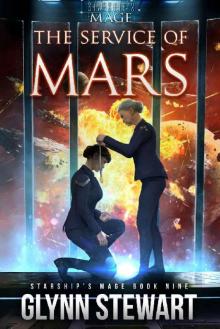 The Service of Mars
The Service of Mars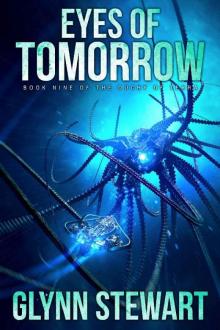 Eyes of Tomorrow (Duchy of Terra Book 9)
Eyes of Tomorrow (Duchy of Terra Book 9) Darkness Beyond (Light of Terra: a Duchy of Terra series Book 1)
Darkness Beyond (Light of Terra: a Duchy of Terra series Book 1) Drifter's Folly (Peacekeepers of Sol Book 4)
Drifter's Folly (Peacekeepers of Sol Book 4) Conviction (Scattered Stars: Conviction Book 1)
Conviction (Scattered Stars: Conviction Book 1)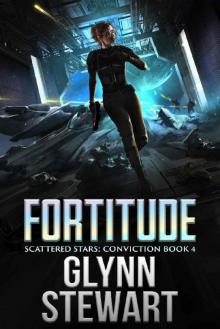 Fortitude (Scattered Stars: Conviction Book 4)
Fortitude (Scattered Stars: Conviction Book 4) Refuge
Refuge A Question of Faith: A Castle Federation Novella
A Question of Faith: A Castle Federation Novella Crusade (Exile Book 3)
Crusade (Exile Book 3) Raven's Peace
Raven's Peace A Darker Magic (Starship's Mage Book 10)
A Darker Magic (Starship's Mage Book 10) Fae, Flames & Fedoras
Fae, Flames & Fedoras Q-Ship Chameleon
Q-Ship Chameleon Duchess of Terra (Duchy of Terra Book 2)
Duchess of Terra (Duchy of Terra Book 2)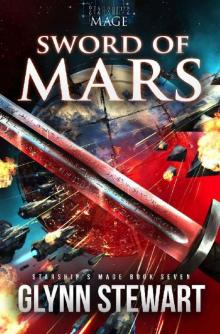 Sword of Mars
Sword of Mars Rimward Stars (Castle Federation Book 5)
Rimward Stars (Castle Federation Book 5) Q-Ship Chameleon (Castle Federation Book 4)
Q-Ship Chameleon (Castle Federation Book 4)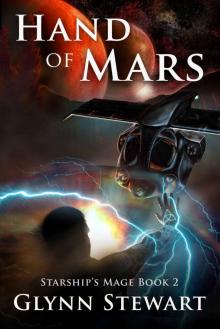 Hand of Mars (Starship's Mage Book 2)
Hand of Mars (Starship's Mage Book 2) Terra and Imperium (Duchy of Terra Book 3)
Terra and Imperium (Duchy of Terra Book 3)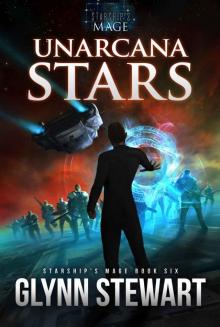 UnArcana Stars
UnArcana Stars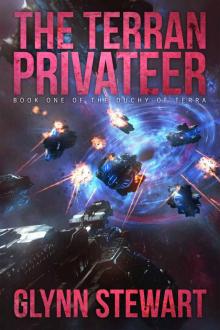 The Terran Privateer
The Terran Privateer ONSET: To Serve and Protect
ONSET: To Serve and Protect Starship's Mage: Episode 4
Starship's Mage: Episode 4 Operation Medusa (Castle Federation Book 6)
Operation Medusa (Castle Federation Book 6) ONSET: Blood of the Innocent
ONSET: Blood of the Innocent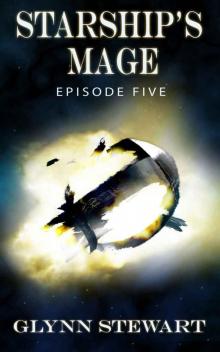 Starship's Mage: Episode 5
Starship's Mage: Episode 5 Hunter's Oath
Hunter's Oath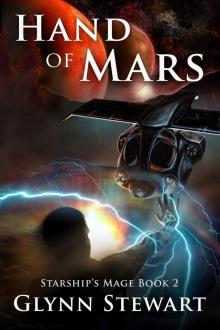 Starship's Mage 2 Hand of Mars
Starship's Mage 2 Hand of Mars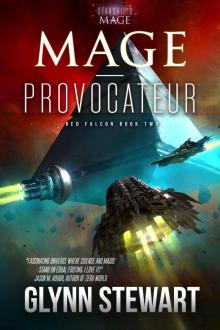 Mage-Provocateur (Starship's Mage: Red Falcon Book 2)
Mage-Provocateur (Starship's Mage: Red Falcon Book 2) ONSET: My Enemy's Enemy
ONSET: My Enemy's Enemy Blood Ward
Blood Ward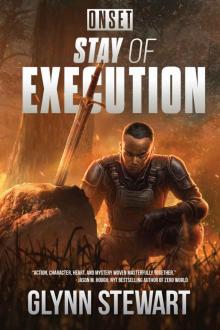 ONSET: Stay of Execution
ONSET: Stay of Execution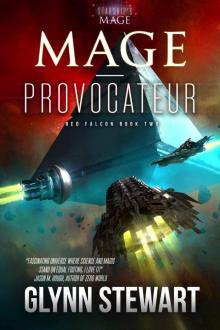 Mage-Provocateur
Mage-Provocateur Voice of Mars (Starship's Mage Book 3)
Voice of Mars (Starship's Mage Book 3)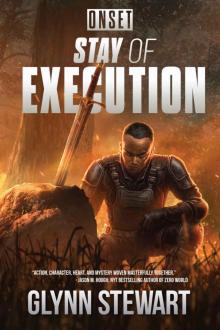 ONSET (Book 4): Stay of Execution
ONSET (Book 4): Stay of Execution Ashen Stars
Ashen Stars Children of Prophecy
Children of Prophecy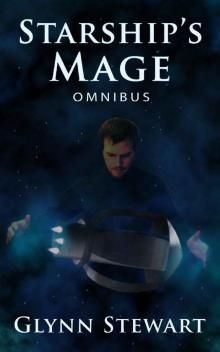 Starship's Mage: Omnibus: (Starship's Mage Book 1)
Starship's Mage: Omnibus: (Starship's Mage Book 1)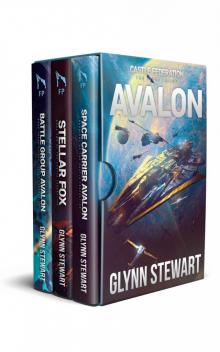 Avalon Trilogy: Castle Federation Books 1-3: Includes Space Carrier Avalon, Stellar Fox, and Battle Group Avalon
Avalon Trilogy: Castle Federation Books 1-3: Includes Space Carrier Avalon, Stellar Fox, and Battle Group Avalon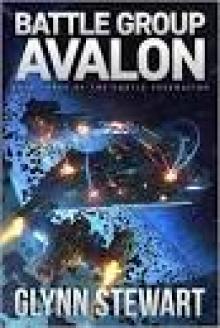 Battle Group Avalon (Castle Federation Book 3)
Battle Group Avalon (Castle Federation Book 3) Stellar Fox (Castle Federation Book 2)
Stellar Fox (Castle Federation Book 2)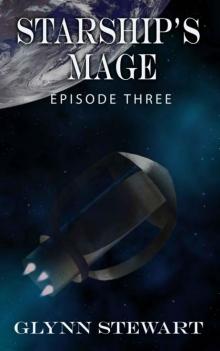 Starship's Mage: Episode 3
Starship's Mage: Episode 3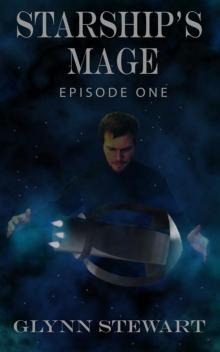 Starship's Mage: Episode 1
Starship's Mage: Episode 1 Operation Medusa
Operation Medusa Agents of Mars (Starship's Mage: Red Falcon Book 3)
Agents of Mars (Starship's Mage: Red Falcon Book 3) Hunter's Oath (Changeling Blood Book 2)
Hunter's Oath (Changeling Blood Book 2) Interstellar Mage (Starship's Mage: Red Falcon Book 1)
Interstellar Mage (Starship's Mage: Red Falcon Book 1) Judgment of Mars (Starship's Mage Book 5)
Judgment of Mars (Starship's Mage Book 5) Alien Arcana (Starship's Mage Book 4)
Alien Arcana (Starship's Mage Book 4) Space Carrier Avalon
Space Carrier Avalon Changeling's Fealty (Changeling Blood Book 1)
Changeling's Fealty (Changeling Blood Book 1) Interstellar Mage
Interstellar Mage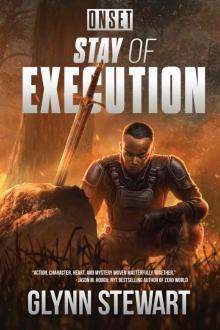 Stay of Execution
Stay of Execution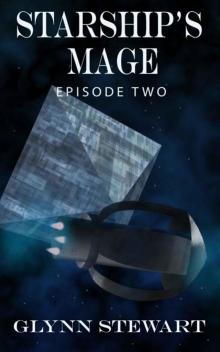 Starship's Mage: Episode 2
Starship's Mage: Episode 2